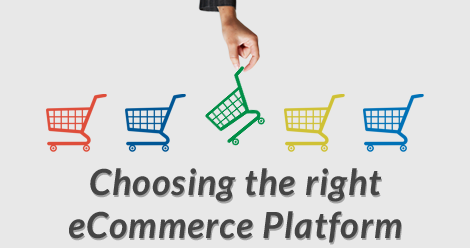There are many e-commerce platforms out there selling the same functions and features. But how would you know which is the right one for you? Choosing just the right platform is crucial as it would be doing most of your work and running your business.
It all depends on your needs and the service(s)that you aim to provide. However, there are a few fundamentals which you need to go through before you start narrowing down your choices. Below, I’m going to discuss a few of the things you should keep in mind while choosing a platform, as well as the notable differences between them.
1. Hosted or Self-hosted
All marketplaces are hosted. However, if you decide to have your own storefront, then you have to decide whether it’s hosted or self-hosted. A hosted platform makes things a lot easier but it leaves you with less control. The advantage is that you don’t have to worry about security, backups, crashes and other hazards as these things are managed by the service provider.
The most important parts of a business are your products and your customers. If you prefer a hosting service, you will have the time to spend on these important facets of your online store.
For self-hosting, you need to buy a hosting space, download the software and upload it. Examples of self-hosted servers include WordPress and WooCommerce. Since you will be looking every aspect of your online store by yourself, you need to beware of the hackers and other security issues. It’s an added burden that you must endure along with building your brand, and selling your products.
2. Apps and Functionality
Many e-commerce platforms have app stores, which allow you to install more functionality based on your needs. If your store shows up traffic, then it’s certainly worth the investment. So you won’t have to worry only about streamlining your business and you can put your attention on other important aspects of your business.
Before considering what app to download, you need to carefully decide what functions will help you in the long run. Some of the functions include shipping, customer service, accounts, analytics, and marketing as well as order management.
3. Business Functionality
As I mentioned earlier, many platforms have similar features and functions. But there are also many others specially-built platforms for specific requirements. For example, Gumroad is built for selling digital products quickly. Cratejoy is built for the subscriptions of products. NuOrder is available for selling to other businesses, while Celery is best for taking pre-orders.
4. Storefront or Marketplace
When you open a new store, you’re never sure of the amount of traffic you might be generating. Online marketplaces like eBay and Amazon are very good examples of profitable stores. However, they became successful only when the traffic flooded on the website.
On the other hand, you have a limited amount of freedom at marketplaces. They’ll grant you space, but you will have to pay them for it. However, if you set up your own store, you end up using the money on marketing and designing. So the budget will not be a problem.
Moreover, owning a marketplace is a bit risky. You never know when it might get attacked by hackers and the data is theft. If this happens, you will lose emails of your customers. On the other hand, when you have your own store, you can get insight into your customers and you are sure that you won’t just lose their contact details all of a sudden.
5. Some of the Top Platforms
Having looked at the basic points, queries and contemplations on your choice of platforms; here is a list of some of the best platforms for you to build your business on.
The platforms listed below are some of the most common and biggest in the industry, having a broad set of features. They’re a great choice for the majority of the new and growing businesses.
- Shopify
- Bigcommerce
- WordPress/WooCommerce
- SparkPay
- Volusion
- SquareSpace
The platforms listed below are newer and based on their special features. They cater to small businesses that have a more specified purpose. These platforms focus on one or two features based on your needs and priorities.
- GoSpaces
- Selz
- Pulley
- Sello
- CrateJoy
- Gumroad
- GoSpaces
- Celery
- Subbly
- Sellfy
- NuOrder
To know about more e-commerce platforms, you can look into this comparison chart.
Hopefully, this article provides you with enough information to help you make the right choice for an e-commerce platform. From my personal experience, I’d probably suggest a traditional platform, such as Shopify as it provides a wonderful user experience for the customers.
Author Bio:
Mark Peter is working as an HR manager at a software house in the UK. He has vast experience of managing activities related to employees. Apart from work, he also works for UK Essay Writing firm in order to provide guidance to students while dealing with dissertations. Furthermore, in order to connect with him, follow via Google+ | Twitter | Facebook.
